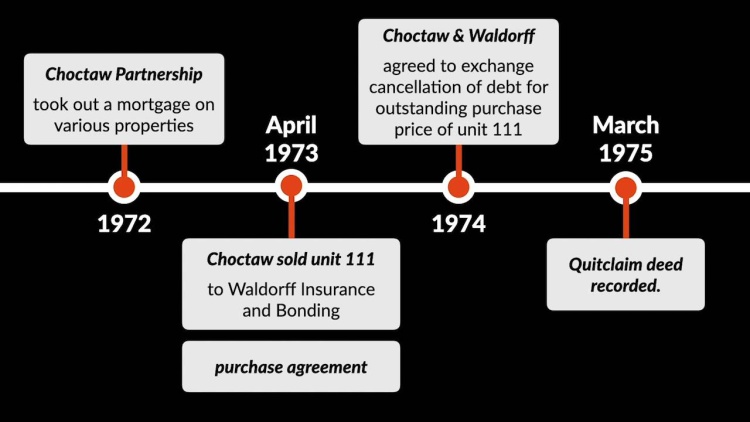Waldorff Insurance and Bonding, Inc. v. Eglin National Bank
Florida District Court of Appeal
453 So.2d 1383 (1984)
- Written by Dennis Chong, JD
Facts
Choctaw Partnership (Choctaw) developed a condominium complex. In 1972, Choctaw secured a mortgage of $850,000 for this property. This mortgage was assigned to Eglin National Bank (defendant) (Eglin) in 1975. Meanwhile, in April 1973, Waldorff Insurance and Bonding, Inc. (plaintiff) (Waldorff) entered into a sales contract with Choctaw regarding Unit 111 of the building. Waldorff put a down payment on the unit, paid to furnish it, paid all fees associated with it, and had exclusive access to the unit. In October 1973, Choctaw obtained another mortgage with Eglin on the condominium, including Unit 111. In June 1974, Choctaw obtained still another mortgage on the property, including Unit 111, from Eglin. In 1974, Choctaw, who was also a client of Waldorff, negotiated a deal whereby Waldorff would “write off” the balance due on Choctaw’s account in exchange for Choctaw considering the mortgage debt for Unit 111 paid in full. The deed transferring Unit 111 to Waldorff was recorded in March 1975. In 1976, Eglin foreclosed on Choctaw. The trial court determined that Waldoff’s claim to ownership of Unit 111 was “equivocal” because Choctaw allowed other persons to occupy and use other units, thereby making Waldorff’s claim to ownership appear questionable, and because Waldorff had not supplied consideration to complete the sale transaction. Thus, it held that Waldorff’s interest in Unit 111 was not superior to the liens created by the 1973 and 1974 mortgages. Waldorff appealed.
Rule of Law
Issue
Holding and Reasoning (Shivers, J.)
What to do next…
Here's why 907,000 law students have relied on our case briefs:
- Written by law professors and practitioners, not other law students. 47,100 briefs, keyed to 996 casebooks. Top-notch customer support.
- The right amount of information, includes the facts, issues, rule of law, holding and reasoning, and any concurrences and dissents.
- Access in your classes, works on your mobile and tablet. Massive library of related video lessons and high quality multiple-choice questions.
- Easy to use, uniform format for every case brief. Written in plain English, not in legalese. Our briefs summarize and simplify; they don’t just repeat the court’s language.





